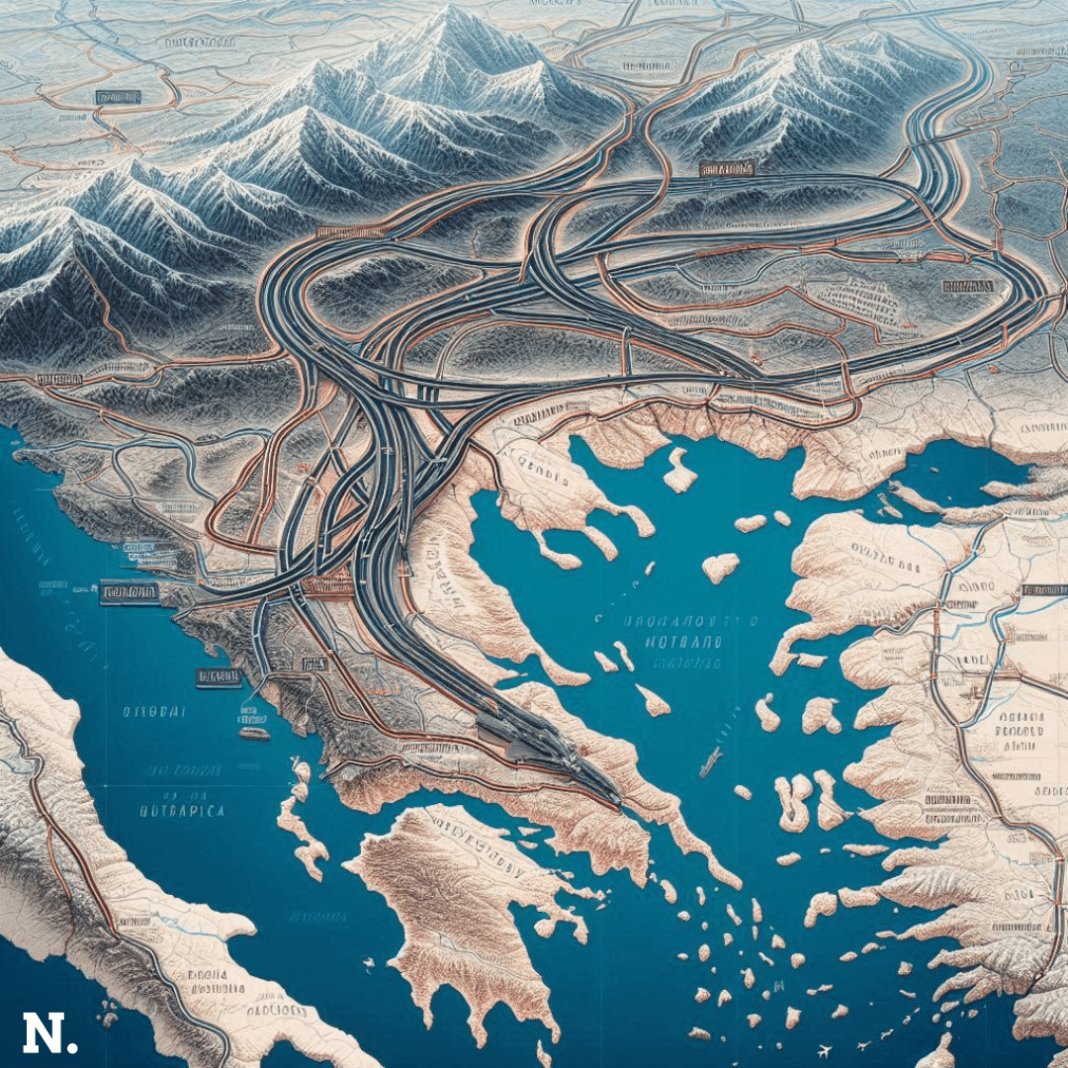The Western Balkans have long been a vital crossroads for trade, culture, and geopolitics. They are recognized for their strategic significance as a bridge connecting the East and the West. The Western Balkans includes countries like Kosovo and Albania. This region holds a unique position in European geopolitics. Its location attracts the economic and political interests of global powers. The importance of the Western Balkans is deeply rooted in history. Its significance continues to grow today. The region serves as a bridge connecting Europe with Asia and the Middle East. Road infrastructure has recently become a key factor in its geopolitical landscape. The development of major road corridors has further influenced this dynamic.
The Role of Road Corridors in Economic and Political Development
Road corridors in the Western Balkans are not simply physical highways; they are strategic infrastructures that influence the political and economic dynamics of the region. These corridors serve as essential arteries for trade, connecting local economies with global markets and fostering regional cooperation. Improved road infrastructure can boost trade, encourage investment, and promote economic integration with the European Union (EU), making the region a more attractive partner for international stakeholders.
The historical significance of road corridors can be traced back to ancient times. Major trade routes like the Silk Road and Roman roads connected Europe with Asia and the Near East. These routes facilitated both economic and cultural exchanges. Over time, they evolved into modern transport corridors. These corridors now play a critical role in international trade and development strategies. In the 20th century, road infrastructure gained even more importance. After World War II, Europe and the United States built extensive highways to support economic recovery and integration.
In the Western Balkans, road corridors are key to national transport policies. They play a vital role in economic growth and international relations. Governments, especially in Kosovo and Albania, have focused on developing these corridors. The goal is to improve connectivity with the rest of Europe. International organizations like the South East Europe Transport Observatory (SEETO) have been crucial in coordinating these efforts. They ensure that road infrastructure aligns with broader regional development goals.
Geopolitical Influence of Major Powers in the Western Balkans
The Western Balkans’ strategic location has drawn the interest of global powers. These include the European Union, China, Russia, the United States, and Turkey. Each of these powers sees the region as geopolitically important. They view road infrastructure investments as a way to expand their influence. These investments help strengthen political ties with the Western Balkans. Additionally, they aim to enhance economic connections with the region.
European Union: The EU has been a major player in the development of road corridors in the Western Balkans, viewing improved infrastructure as a way to integrate the region more closely with Europe. Projects like the Trans-European Transport Network (TEN-T) aim to enhance connectivity between Western Balkan countries and EU member states. Germany, in particular, has been a leading investor in these initiatives, notably with projects such as Corridor X, which connects the Balkans with central Europe. Consequently, by developing these corridors, the EU seeks to foster regional stability and economic growth. Simultaneously, this effort aims to counter the influence of other major powers like Russia and China.
China: China’s Belt and Road Initiative (BRI), launched in 2013, is a global infrastructure project aimed at connecting Asia, Europe, and beyond through a network of roads, railways, and ports. In the Western Balkans, China has invested heavily in road infrastructure, viewing the region as a key gateway to European markets. By financing and constructing transport networks, China aims to increase its economic influence in the region. However, these investments often come with political and economic dependencies, as countries become reliant on Chinese funding for infrastructure projects.
Russia: Russia has historical ties to Serbia and other Western Balkan countries. It has invested in the region’s energy and transportation infrastructure. These investments are aimed at preserving Russia’s influence in the area. Through road corridors and energy pipelines, Russia seeks to strengthen its presence. It competes with the European Union and China for regional influence. Russia’s focus on road infrastructure is part of a broader strategy to maintain access to European markets.
United States: The U.S. has significantly influenced the Western Balkans’ geopolitical environment, especially after the end of the Cold War. Through investments in infrastructure and strategic partnerships, the U.S. has supported the development of road corridors to promote regional stability and economic growth. These investments are a part of a larger strategy to counteract the rising power of China and Russia in the area and preserve American influence.
Turkey: Turkey has stepped up its spending in the Western Balkans’ road network, especially in nations like Kosovo and Albania where the overwhelming population is Muslim. By building transportation networks, Turkey hopes to improve its cultural and economic relations with the area. Turkey’s interest in the Balkans is both strategic and cultural, as it seeks to expand its influence through infrastructure projects and trade partnerships.
Challenges and Opportunities for the Western Balkans
While the development of road corridors presents significant opportunities for economic growth and regional cooperation, it also brings new challenges for countries like Kosovo and Albania. One of the primary concerns is the potential for increased dependence on foreign powers, as investments in infrastructure often come with political strings attached. Countries must navigate these dependencies carefully to avoid being caught in geopolitical rivalries between global powers.
Moreover, competition between major powers for control over road corridors can lead to political instability. The European Union, China, Russia, and the United States all have vested interests in the region, and their competing ambitions can create tensions. For small countries like Kosovo and Albania, this geopolitical competition requires careful management to ensure that national interests are preserved.
Road corridors in the Western Balkans are far more than just transport routes. They are strategic assets that shape the political and economic future of the region. Major powers are heavily investing in infrastructure in the Western Balkans. The region sits at the center of global geopolitical competition. This brings opportunities for economic development. However, it also introduces challenges in managing foreign influence. The future of the Western Balkans hinges on leveraging these road corridors for growth. At the same time, it must protect its political independence.





